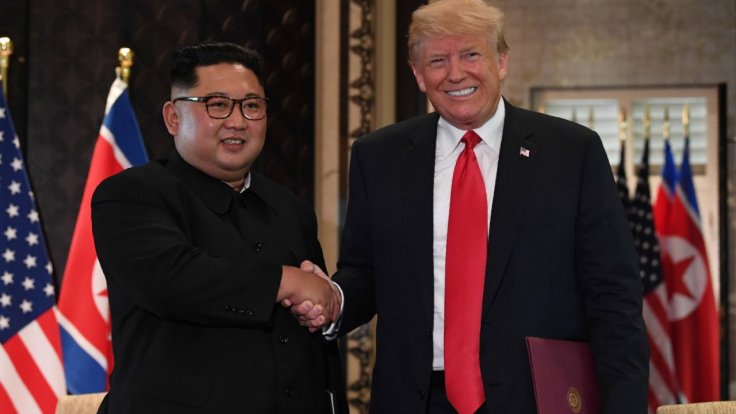
U.S. President Donald Trump and North Korean leader Kim Jong Un meet on Wednesday for their second summit, betting that their personal relationship can break a stalemate over the North's nuclear weapons and end more than 70 years of hostility.
Despite little progress toward his stated goal of ridding North Korea of its nuclear weapons since first meeting Kim in Singapore last year, Trump has said he is fully committed to his personal diplomacy with Kim.
Trump said late last year he and Kim "fell in love", and on the eve of his departure for the second summit said they had developed "a very, very good relationship".
Whether the bonhomie can move them beyond summit pageantry to substantive progress on eliminating Pyongyang's nuclear arsenal that threatens the United States is the question that will dominate their talks in the Vietnamese capital of Hanoi.
"This relationship is the biggest single driving force in crafting better relations," said Harry J. Kazianis, director of Korea Studies, Centre for the National Interest.
"Clearly, there needs to be a more solid foundation for dialogue than Kim and Trump. No two people alone have broad enough shoulders to take on the weight of such challenging issues spread out over 70 years."
Trump will meet Kim for a brief one-on-one conversation on Wednesday evening, followed by a dinner, accompanied by two guests and interpreters, White House spokeswoman Sarah Sanders told reporters on Air Force One.
They will hold "a series of back and forth" meetings on Thursday, she said.
In Singapore, they pledged to work toward denuclearisation and permanent peace on the Korean peninsula. North and South Korea have been technically still at war since their 1950-53 conflict, with the Americans backing the South, ended in a truce, not a treaty.
The Singapore meeting - the first between a sitting U.S. president and a North Korean leader - ended with great fanfare but little substance over how to dismantle North Korea's nuclear weapons and ballistic missiles.
Both sides are likely to feel pressure to agree on specific measures this time - what concrete steps North Korea will take to give up weapons that threaten the U.S. mainland, and what the United States will offer in return.
Many analysts believe North Korea won't commit to significant disarmament unless punishing U.S.-led economic sanctions are eased.
Trump has held out the prospect of easing them if North Korea does something "meaningful".
HUMAN RIGHTS
Any deal will face scrutiny from American lawmakers and others sceptical that North Korea is really willing to give up the cherished weapons it has long seen as its guarantee of national security, amid worry a compromise could undermine U.S. regional interests.
U.S. intelligence officials have said there is no sign Kim will ever give up his entire arsenal, and U.N. investigators say human rights have not improved in North Korea.
Trump scoffs at the doubters.
He has hailed the Singapore summit as a "tremendous success", citing a freeze in North Korea's nuclear and missile tests since late 2017, and has said the United States would have gone to war with North Korea if he had not been president.
Whatever the outcome, the summit should boost Kim's bid to end his country's pariah status and cement his place on the world stage.
As the young, third-generation leader of one of the world's most impoverished and isolated nations, living under punishing sanctions, Kim will again stand as an equal to the president of the world's most powerful country.
For Trump, a deal that eases the North Korean threat could hand him a big foreign-policy achievement in the midst of domestic troubles.
While Trump is in Hanoi, his former personal lawyer Michael Cohen is testifying before U.S. congressional committees, with the president's business practices the main focus.Anticipation has also been rising about the impending release of Special Counsel Robert Mueller's report on Russian interference in the 2016 U.S. election, though a senior U.S. Justice Department official said on Friday it would not come this week.
South Korean President Moon Jae-in said last year Trump deserved the Nobel Peace Prize. This month, Trump said Japanese Prime Minister Shinzo Abe nominated him for it because "they feel safe" after he initiated talks and eased tension.
CONCESSIONS?
In the run-up to the second summit, Trump has indicated a more flexible stance, saying he is in no rush to secure North Korea's denuclearisation.
The two sides have discussed specific and verifiable denuclearisation measures, such as allowing inspectors to observe the dismantlement of North Korea's Yongbyon nuclear reactor, U.S. and South Korean officials say.
U.S. concessions could include opening liaison offices or declaring an end to the technical state of war, they say.
Kazianis said a political declaration that ended the war would be a win for both sides.
"Nothing could test Kim's intentions more than setting a new course in ... relations and in the best way possible prove America is no threat to his regime," he said.
Vietnam, relishing its role as mediator, could serve as a model for North Korea as it seeks a path out of isolation.
Vietnam normalised ties with old battlefield foe the United States in 1995 after decades of Cold War mistrust, and its "doi moi" reforms transformed it into one of Asia's fastest-growing economies.









